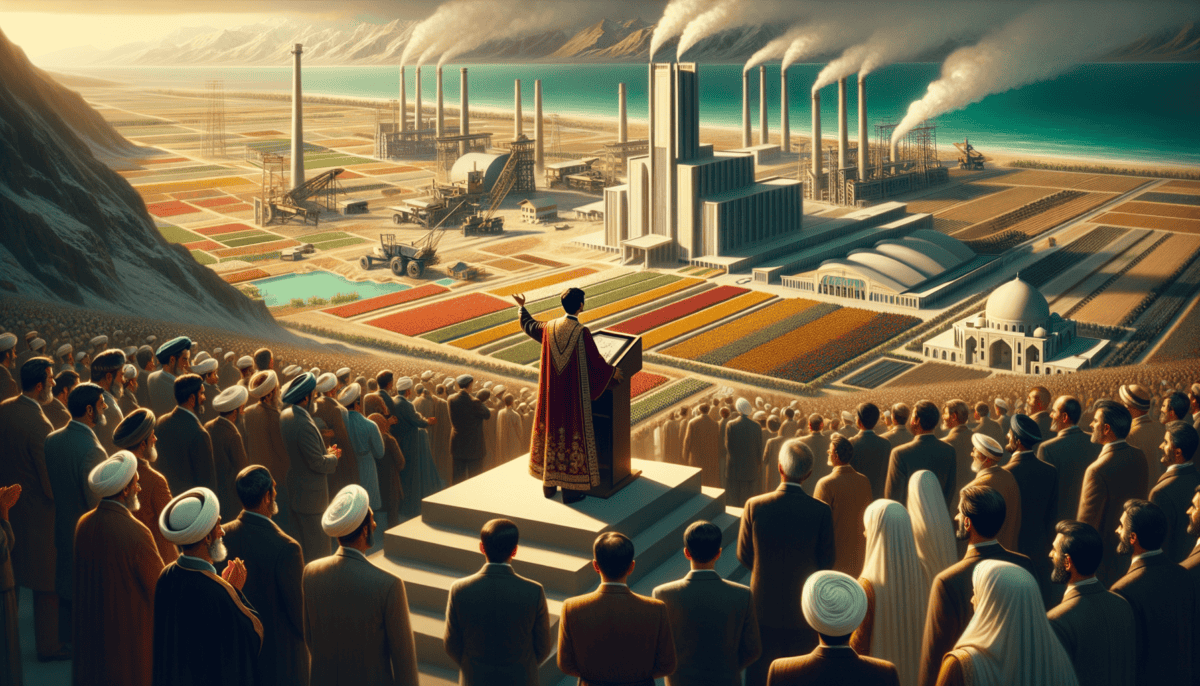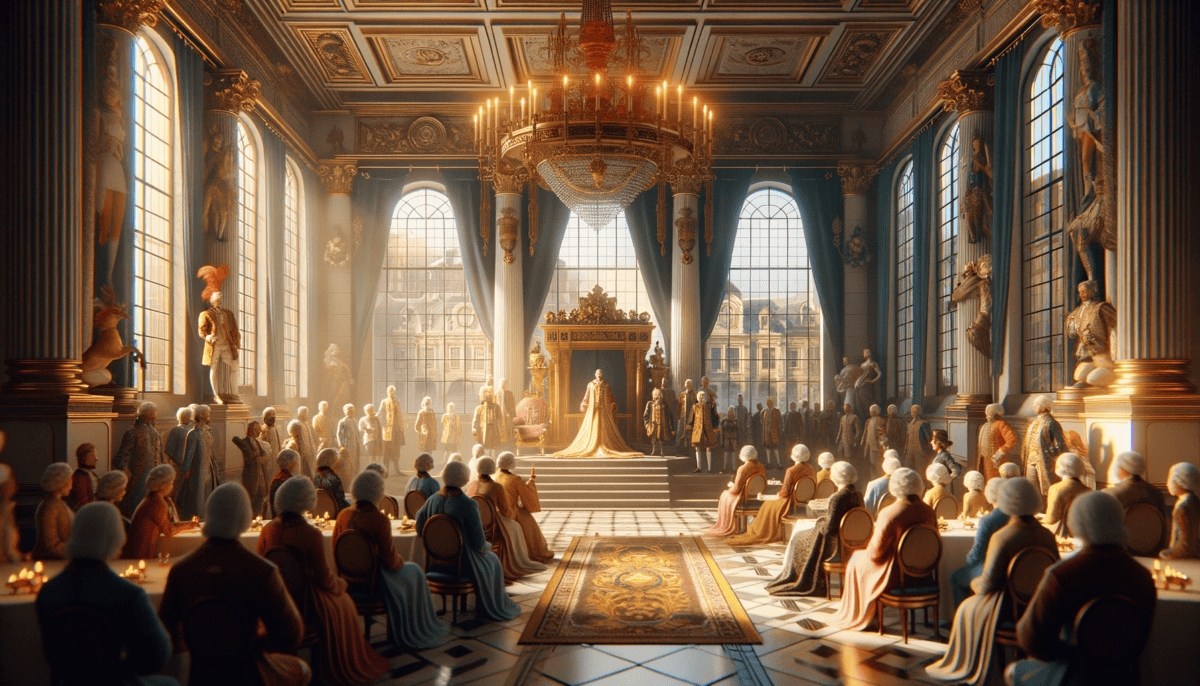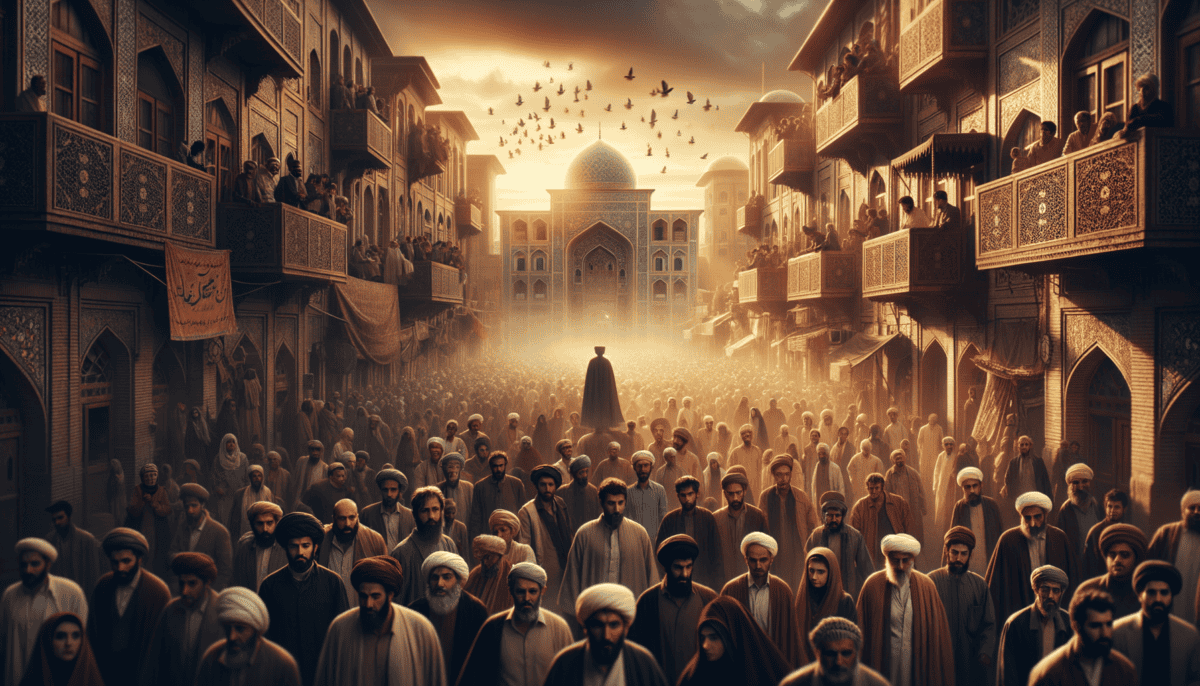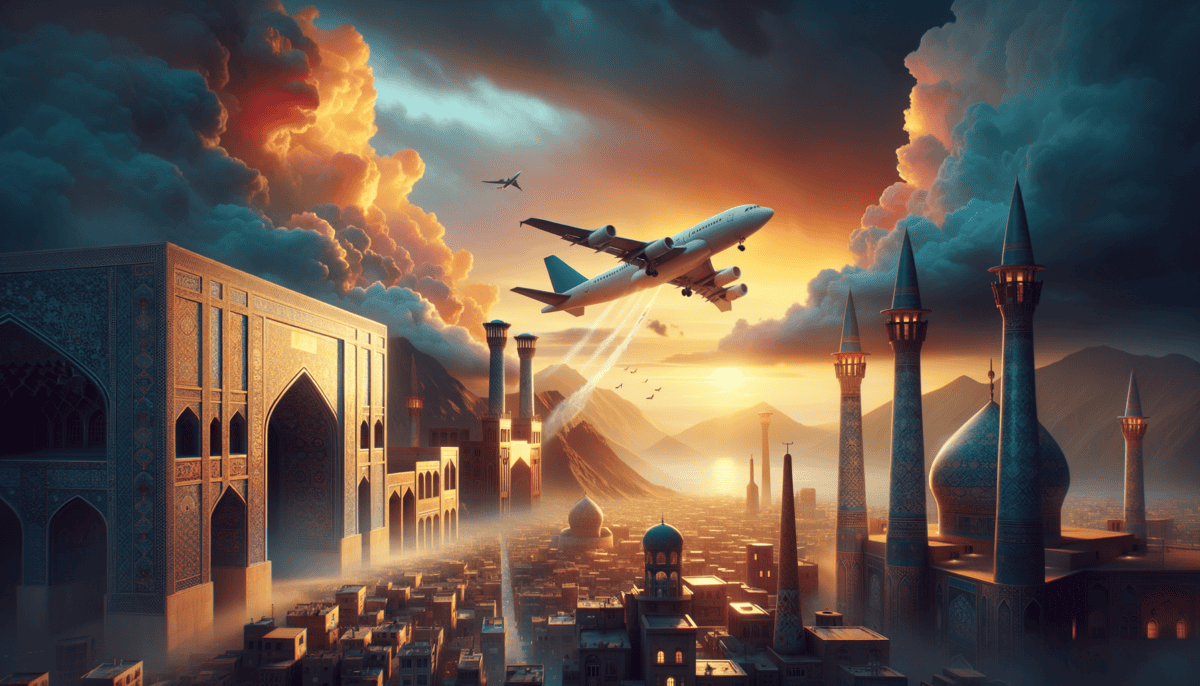The Unexpected Heir
On a crisp morning in Tehran, 1919, a little boy named Mohammad Reza ran through the palace gardens. His father, Reza Shah, watched with stern eyes as the young prince chased butterflies between the tall cypress trees.
"My son," Reza Shah called out, his voice echoing across the courtyard. "A future king must not waste time playing. Come, it's time for your lessons."
Mohammad Reza was just like any other child who loved to play and have fun. But his life was different from most children. He lived in a big palace with golden doors and beautiful carpets. His father wasn't just any dad – he was the ruler of Iran, a country as big as Alaska!
When Mohammad Reza turned eleven, something big happened. His father sent him far away to Switzerland for school. It was scary being so far from home, but he made new friends and learned to speak French and English.
"I miss the smell of saffron in mother's kitchen," he wrote in his diary one night. "But father says a good king must know about the world."
Years passed quickly, and Mohammad Reza grew taller and stronger. But nothing prepared him for what happened in 1941. He was only 21 years old when British and Russian soldiers came to Iran during World War II.
One morning, everything changed…
"Your Highness," a servant burst into Mohammad Reza's room. "Your father… he must leave the country. You are to be the new Shah!"
Mohammad Reza's heart beat fast. He wasn't ready to be king! But he had no choice. His father had to go away, and suddenly, this young man became the ruler of millions of people.
Being the new Shah wasn't easy. The country had big problems:
- Foreign armies were in Iran
- Many people were poor and hungry
- Some powerful people didn't think he was ready to be king
- He had to learn how to rule a country overnight
But young Mohammad Reza tried his best. He remembered his father's strict lessons and his time in Switzerland. He wanted to make Iran strong and modern, just like the European countries he had seen.
Each night, as he sat on his father's throne, Mohammad Reza would look at the peacock jewels that decorated the royal crown. They sparkled like stars, but they felt heavy on his young head. He had to grow up fast and learn to be strong.
"I will make you proud, father," he whispered to himself. "I will make Iran great."
The palace that once seemed so big and full of fun now felt serious and important. The little boy who once chased butterflies was now responsible for millions of lives. It was the beginning of a story that would change Iran forever.
Dreams of Modernization
The year was 1963, and Shah Mohammad Reza Pahlavi stood at his palace window, watching the sun rise over Tehran. He had a big dream – to make Iran modern and strong.
“Today,” he announced to his advisors, “we begin the White Revolution!”
The Shah remembered his time in Switzerland, where he saw clean cities and happy farmers. He wanted Iran to be just like that. His plan had some big ideas:
- Give farm land to poor farmers
- Build new schools for girls and boys
- Make big factories to create jobs
- Help women vote and work like men
- Bring doctors to small villages
“But Your Majesty,” warned an old advisor, stroking his gray beard. “Some people don’t want these changes. They like things the old way.”
The Shah looked at the modern buildings rising in Tehran. “Iran must wake up,” he said firmly. “We cannot stay in the past forever.” ️
Many exciting things started happening. Big machines helped farmers grow more food. New schools opened their doors. Women started working in offices and hospitals. Iran was changing fast!
In the busy bazaars of Tehran, people whispered. Some religious leaders were angry. They didn’t like the new ways. Old shop owners worried about big new stores taking their customers.
“Change is hard,” the Shah told his wife, Queen Farah. “But we must keep going forward.”
The Shah spent lots of money building things:
✨ Shiny new airports
✨ Big hospitals
✨ Fast highways
✨ Modern universities
Iran was getting richer from selling oil to other countries. The Shah used this money to buy new things:
️ Modern airplanes
Big factories
Fancy cars
New medicine
But there was a problem. While some people in the big cities got richer, many people in small towns and villages stayed poor. The gap between rich and poor grew bigger and bigger.
One day, a young student asked the Shah, “Why are some people still so poor when our country has so much money?”
The Shah didn’t have a good answer. He thought if he made Iran modern fast enough, everyone would eventually be happy. But he was starting to see that making big changes wasn’t as easy as he thought.
As the sun set over Tehran each evening, the Shah would look at his modern city with pride. The tall buildings sparkled, and cars zoomed down new highways. But in the quiet moments, he worried about the grumbling he heard from the bazaars and mosques.
The White Revolution was changing Iran, but was it changing too fast? Or maybe not in the right way? These questions would keep the Shah awake at night, as his dream of a modern Iran grew bigger – and more complicated – with each passing day.
The Glittering Facade
The grand Niavaran Palace sparkled under the Tehran sun. Inside, Shah Mohammad Reza Pahlavi sat on a golden throne, wearing his finest uniform covered in medals.
“Your Majesty,” a nervous servant bowed, “the new crystal chandeliers from France have arrived.”
The Shah nodded, barely looking up from his papers. He was used to beautiful things now. His palaces had:
Gold-trimmed furniture
Rare Persian carpets
Priceless art from around the world
Gardens with peacocks walking freely
But while the Shah lived in luxury, many Iranian people struggled to buy food. In the crowded streets of Tehran, a boy named Hassan watched his father count their few coins carefully.
“Why does the Shah need so many palaces,” Hassan asked, “when we can barely afford bread?”
The father was right to be careful. The Shah had created a special police force called SAVAK. They were everywhere, listening for anyone who complained about the government.
In his shiny palace, the Shah thought he was doing the right thing. “We must keep Iran safe and orderly,” he told his advisors. But his secret police made people afraid.
Queen Farah sometimes worried about this. One day, she said to her husband, “Perhaps we should listen more to what the people are saying?”
But the Shah waved away her concerns. “They don’t understand what’s best for Iran. We must guide them, like a father guides his children.”
The gap between the Shah and his people grew bigger every day:
The Shah had many palaces
Many people lived in tiny homes
The palace served fancy meals
Some families couldn’t afford enough bread
Students at Tehran University started meeting in secret. Teachers whispered in quiet classrooms. Shopkeepers in the bazaar shared worried looks. The anger was growing, but quietly, like a pot slowly coming to boil.
One evening, as the Shah watched a beautiful sunset from his palace balcony, a young palace guard gathered courage to speak.
“Your Majesty,” the guard said softly, “the people in my neighborhood are unhappy. They feel… forgotten.”
The Shah frowned. He didn’t like hearing such things. “Send them to SAVAK if they complain,” he ordered.
But that night, alone in his golden bedroom, the Shah couldn’t sleep. Through his window, he could see the lights of Tehran twinkling below. The city looked peaceful, but something didn’t feel right.
The more he tried to control his people, the more they pulled away. His beautiful palaces started to feel like golden cages, trapping him far from the real Iran that lived and breathed in the streets below.
The Shah had wanted to build a modern fairy tale, but he was learning that even the shiniest facade can hide deep cracks. As he finally drifted off to sleep, the sounds of the city below carried whispers of change – whispers that would soon grow into a roar.
Western Alliances and Complications
The year was 1953, and the Shah paced nervously in his study at Saadabad Palace. A crucial message had just arrived from Washington D.C.
“Your Majesty,” announced his advisor, “President Eisenhower sends his warmest regards. The Americans want to help make Iran stronger.”
The Shah smiled, remembering his school days in Switzerland. He had always admired the West. Now America wanted to be Iran’s closest ally!
Soon, American helpers came to Iran:
✈️ Military trainers for Iran’s army
Business people with new ideas
️ Engineers to build modern buildings
“See how strong Iran is becoming?” the Shah told his ministers proudly. “We’re as important as any Western country now!”
The Shah frowned. In the streets of Tehran, not everyone was happy about the many Americans in their city. Mohammad, a young shopkeeper, watched the foreigners walk past his store.
“They act like they own our country,” Mohammad told his friend quietly. “And the Shah lets them do whatever they want.”
At the university, students began holding secret meetings. “Why does Iran need America to tell us what to do?” they asked. “Aren’t we strong enough on our own?”
The Shah tried to explain to his people: “America is helping us become modern and powerful. They’re our friends!”
But then came the Cold War. America was fighting with Russia, and Iran got caught in the middle. The Shah had to pick sides.
The Shah chose America because:
They promised to protect Iran
They would buy Iran’s oil
They gave Iran new weapons
They helped Iran’s economy grow
Queen Farah watched her husband become more dependent on American support. One evening, she found him staring at a map of Iran.
“What troubles you, my dear?” she asked.
“Some say I’m just America’s puppet,” he replied softly. “But they don’t understand – I’m using America’s help to make Iran great!”
But the problems kept growing. Religious leaders didn’t like Western influence on Iranian culture. Poor people were angry that only rich Iranians seemed to benefit from American friendship.
One day, a group of students protested outside the American Embassy. “Iran for Iranians!” they shouted. The Shah sent his police to stop them, but more protests followed.
In his palace, surrounded by American-made luxury, the Shah felt the ground shifting under his feet. He had wanted America’s help to make Iran strong. But now that help was making some Iranians very angry.
As night fell over Tehran, the Shah stood at his window. American rock music played from a nearby house, while the evening call to prayer echoed from an old mosque. These two different sounds seemed to fight in the air, just like the two different worlds fighting for Iran’s future.
The Shah had tied Iran’s future to America. But he was starting to wonder if that choice might cost him his throne.
The Storm Gathers
The year was 1977, and dark clouds were gathering over Tehran. The Shah sat in his golden office, looking more tired than ever.
“Look at all we’ve built!” the Shah said, pointing to the city outside his window. Tall buildings reached for the sky, and fancy cars filled the streets. But beneath this shiny surface, trouble was brewing.
Dr. Amini, the Shah’s doctor, noticed his patient wasn’t well. “Your Majesty seems worried,” he said gently.
“How can I not worry? The people are angry, but I’ve given them everything – schools, hospitals, modern cities!”
In the busy bazaars of Tehran, different voices were getting louder:
Students demanded more freedom
Poor people complained about high prices
Workers wanted better jobs
A powerful religious leader named Ayatollah Khomeini was sending recorded messages from far away. People listened to these tapes in secret:
“The Shah has forgotten our ways,” Khomeini’s voice crackled through hidden speakers. “He thinks he’s a Western king, not an Iranian one.”
Queen Farah watched her husband grow more distant. “Perhaps we should listen to what the people want,” she suggested one evening.
“But I know what’s best for them!” the Shah insisted, though his voice trembled slightly. “They’re like children who don’t understand what’s good for them.”
Meanwhile, the problems kept getting bigger:
| ❌ Food prices went up | ❌ Jobs became harder to find |
| ❌ People wanted more freedom | ❌ The police got stricter |
One day, a young woman named Maryam joined a protest in Tehran University. “We want freedom!” the students chanted. The police came with tear gas, but more students joined the next day.
The Shah’s health was getting worse too. Cancer was making him weak, but he tried to hide it. “I must stay strong,” he told his mirror. “Iran needs me.”
The Shah remembered how his father had lost the throne, and fear gripped his heart. He tried different things to calm the people:
✓ He promised more freedoms
✓ He tried talking to religious leaders
But it was too late. The storm was already here.
In the streets, more and more people joined the protests. They weren’t afraid anymore. They carried pictures of Ayatollah Khomeini and shouted against the Shah.
One cold winter evening, the Shah stood alone in his palace. Outside, he could hear distant shouts from the protesters. The modern Iran he had tried to build was slipping through his fingers like sand.
Queen Farah found him there, staring into the darkness. “What will we do?” she asked softly.
The Shah turned to her, his face gray with worry. “I don’t know anymore,” he whispered. “I don’t know.”
Last Days of the Peacock Throne
On a cold January morning in 1979, the Shah looked out one last time at Tehran’s snow-covered mountains. His eyes were filled with tears as he prepared to leave the country he had ruled for 37 years.
“I never thought it would end like this,” he whispered to Queen Farah, who stood beside him with their children.
The royal family walked quietly to their plane. The Shah’s hand trembled as he waved goodbye. Behind them, their beautiful palaces stood empty, like giant dollhouses nobody wanted to play with anymore.
In the busy squares of Tehran, people danced and sang:
A new day has come for you and me!”
Two weeks later, Ayatollah Khomeini returned to Iran like a conquering hero. Millions of people lined the streets to welcome him. The Shah watched this on TV from far away, his heart heavy with sadness.
| Egypt | Morocco | Bahamas | Mexico |
His cancer got worse, and fewer countries wanted to help him. Even his old friend America wasn’t sure about taking him in.
“Remember when we were the most powerful family in Iran?” young Prince Reza asked his father one day.
Back in Iran, big changes were happening fast:
– Iran became an Islamic Republic
– Many of the Shah’s modern changes were undone
– Women had to follow strict dress codes
Finally, very sick, the Shah found refuge in Egypt. President Sadat welcomed him like a brother. In his last days, the Shah thought about his life:
“I wanted to make Iran great,” he told his doctor. “I built universities, factories, and hospitals. But maybe I went too fast. Maybe I didn’t understand my own people.”
On July 27, 1980, the Shah died in Egypt, far from his beloved Iran. He was only 60 years old.
Today, the Iran that the Shah knew is very different. His great palaces are museums where people look at the fancy things he left behind. His dream of a Western-style Iran changed into something else entirely.
Queen Farah still lives in Paris, keeping memories of old Iran alive. Prince Reza, now grown up, dreams of returning to Iran one day, though that seems unlikely.
The story of the Shah teaches us something important: even kings and queens can lose everything if they don’t listen to their people. His story reminds us that real power comes from understanding and respecting others, not just from having a crown.
As the sun sets over Tehran today, the city looks very different from the one the Shah left behind. But in quiet corners, some old people still remember the king who tried to change Iran too fast, and lost everything in the process.






